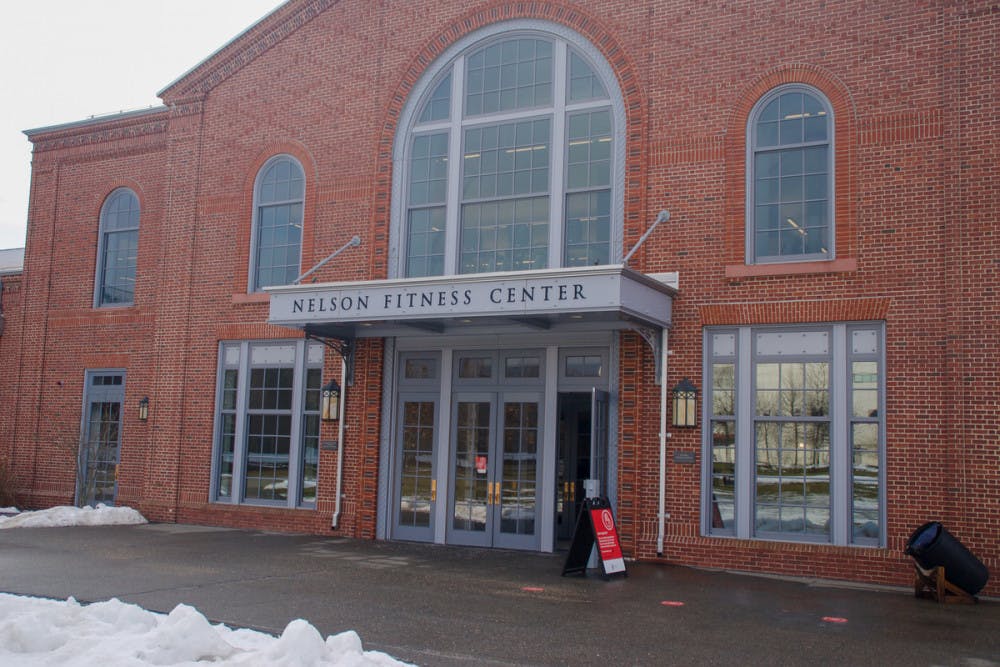Every day at midnight, students race to book time slots to access the Nelson Fitness Center on its website, scheduling one-hour workout sessions four days in advance. Prior to the pandemic, Howard Silverman ’22 went to the gym about six times a week to work out. But, now, the coveted reservations fill up within minutes, and Silverman finds himself working out at the Nelson only once a week.
The Nelson Fitness Center reopened for the spring semester Feb. 8 with limited capacity, observing strict health guidelines to combat the spread of COVID-19. While the fitness loft was open for part of the fall semester beginning in October, the center expanded operations for the spring, including reopening the Katherine Moran Coleman Aquatics Center and, as of Feb. 20, in-person group fitness sessions.
As in the fall semester, students book time slots using an online reservation system to access the facilities, with slots opening at midnight four days in advance. The reservation system aims to ensure students can properly socially distance, and allows for any necessary contact tracing, according to Fitness and Wellness Coordinator Kelly Sorge.
The increased undergraduate population on campus for the spring semester has made it more challenging to accommodate student demand, Sorge said.
“With the COVID guidelines in the gym, we’re only allowed to have 30 people here at a time. And with so many more students on campus, there’s definitely a lot of competition for who’s going to get a slot,” Sorge said, adding that pool reservations have seen increased demand as well.
Prior to the pandemic, Daniel Cody ’22 “usually (went to the gym) every week day.” But, due to competition in booking a time slot, this semester he has only been able to go one time.
“I don’t even know how people get in,” he said. “I’ve been checking every day and (the reservations) just fill up so quickly.”
Nelson staff are trying to find new ways to accommodate student demand and needs, possibly through “extending building hours” or changing the time reservations open.
For Silverman, the process of making a reservation can be “very frustrating,” but, “once you’re there, it’s totally fine.”
To avoid going through the process of fighting for a reservation at the Nelson, some students have stepped off of Brown’s campus for exercise.
Jordan Walendom ’23 has lived in a Brown-leased apartment in River House since the fall semester, and goes to the gym in his off-campus building five to six times a week.
The River House gym has a maximum occupancy of three people at a time and is available 24/7 for resident use, according to Walendom. He feels “very fortunate” not to have to rely on crossing campus to get to the Nelson on a regular basis, and says “it has been very refreshing” to see patrons abide by health regulations in the gym.
Kenneth Bradley ’22 also found the process of booking an appointment overly complicated, adding that every time he checks the reservation website, slots are already full. “If I don’t figure out the pattern of when to sign up, I’ll probably just keep exercising in my room,” he said.
Inside the fitness loft, student workers enforce health guidelines and clean for fifteen minutes in between the hour-long time slot reservations. Once per day, the Department of Facilities Management also sends staff to do a deeper, hydrostatic cleaning, Sorge said. Additionally, some of the equipment has been closed off to maintain six feet of distance between students.
Following these protocols has allowed campus athletics and recreation to return to some semblance of normalcy, according to Sorge.
“Naturally, a lot has changed with COVID, just having stricter guidelines on who can be in the building at one time,” she said. But, with the reopening of additional operations, like the in-person group fitness sessions, the Nelson is “starting to look a little bit more like what it used to look like pre-COVID.”
“I just hope we can make the Nelson Fitness Center as accessible to students as possible,” Sorge said. “I would just love to be able to get as many people into the building that want to be here as possible so that they can exercise.”
With additional reporting by Livia Gimenes
Correction: A previous version of this article listed Kenneth Bradley's planned graduation year as 2023. In fact, his graduation year is 2022. The Herald regrets the error.

Jack Walker served as senior editor of multimedia, social media and post- magazine for The Herald’s 132nd Editorial Board. Jack is an archaeology and literary arts concentrator from Thurmont, Maryland who previously covered the Grad School and staff and student labor beats.





